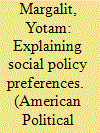| Srl | Item |
| 1 |
ID:
105178


|
|
|
|
|
| Publication |
2011.
|
| Summary/Abstract |
Does globalization's impact on the labor market affect how people vote? I address this question using a new dataset based on plant-level data that measures the impact of foreign competition on the U.S. workforce over an 8-year period. Analyzing change in the president's vote share, I find that voters were substantially more sensitive to the loss of local jobs when it resulted from foreign competition, particularly from offshoring, than to job losses caused by other factors. Yet, I also find that between 2000 and 2004, the anti-incumbent effect of trade-related job losses was smaller in areas where the government certified more of the harmed workers to receive special job training and income assistance. The findings have implications for understanding the impact of international economic integration on voting behavior, as well as for assessing the electoral effect of government programs designed to compensate the losers from globalization.
|
|
|
|
|
|
|
|
|
|
|
|
|
|
|
|
| 2 |
ID:
121091


|
|
|
|
|
| Publication |
2013.
|
| Summary/Abstract |
To what extent do personal circumstances, as compared to ideological dispositions, drive voters' preferences on welfare policy? Addressing this question is difficult because a person's ideological position can be an outcome of material interest rather than an independent source of preferences. The article deals with this empirical challenge using an original panel study carried out over four years, tracking the labor market experiences and the political attitudes of a national sample of Americans before and after the eruption of the financial crisis. The analysis shows that the personal experience of economic hardship, particularly the loss of a job, had a major effect on increasing support for welfare spending. This effect was appreciably larger among Republicans than among Democrats, a result that was not simply due to a "ceiling effect." However the large attitudinal shift was short lived, dissipating as individuals' employment situations improved. The results indicate that the personal experience of an economic shock has a sizable, yet overall transient effect on voters' social policy preferences.
|
|
|
|
|
|
|
|
|
|
|
|
|
|
|
|
| 3 |
ID:
118156


|
|
|
|
|
| Publication |
2012.
|
| Summary/Abstract |
What are the sources of popular opposition to economic globalization? A common answer in the literature is the adverse impact of trade liberalization on some people's labor market standing and earning prospects. Recent studies also note a correlation between nationalist and ethnocentric sentiments and support for trade protectionism, yet do not test whether these non-economic sentiments are actually a cause of the opposition to freer trade. I argue that many individuals fear not only the oft-cited material consequences of trade openness, but also what they perceive to be its social and cultural consequences. I use cross-national survey data and a survey experiment to test this causal claim. The argument also helps explain why less-educated individuals are consistently more apprehensive about international economic integration than more educated individuals, even in the countries in which economic theory predicts otherwise. The findings have implications for the debate over the policy tools for compensating globalization's losers and sustaining popular support for further economic integration.
|
|
|
|
|
|
|
|
|
|
|
|
|
|
|
|
| 4 |
ID:
177781


|
|
|
|
|
| Summary/Abstract |
In response to President Trump instigating conflict over trade with China, the Chinese government countered by issuing tariffs on thousands of products worth over USD 110 billion in US exports. We explore whether China's tariffs reflected a strategy to apply counterpressure by hurting political support for the president's party. We also assess the strategy's impact on the 2018 midterm elections and examine the mechanism underlying the resulting electoral shift. We find strong evidence that Chinese tariffs systematically targeted US goods that had production concentrated in Republican-supporting counties, particularly when located in closely contested Congressional districts. This apparent strategy was successful: targeted areas were more likely to turn against Republican candidates. Using data on campaign communications, local search patterns online, and an original national survey, we find evidence that voters residing in areas affected by the tariffs were more likely to learn about the trade war, recognize its adverse impact, and assign the Republicans responsibility for the escalating dispute. These findings demonstrate how domestic political institutions can be a source of vulnerability in interstate disputes.
|
|
|
|
|
|
|
|
|
|
|
|
|
|
|
|